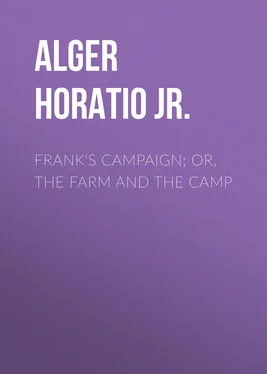Horatio Alger - Frank's Campaign; Or, The Farm and the Camp
Здесь есть возможность читать онлайн «Horatio Alger - Frank's Campaign; Or, The Farm and the Camp» — ознакомительный отрывок электронной книги совершенно бесплатно, а после прочтения отрывка купить полную версию. В некоторых случаях можно слушать аудио, скачать через торрент в формате fb2 и присутствует краткое содержание. Издательство: Иностранный паблик, Жанр: foreign_children, literature_19, foreign_antique, foreign_prose, на английском языке. Описание произведения, (предисловие) а так же отзывы посетителей доступны на портале библиотеки ЛибКат.
- Название:Frank's Campaign; Or, The Farm and the Camp
- Автор:
- Издательство:Иностранный паблик
- Жанр:
- Год:неизвестен
- ISBN:нет данных
- Рейтинг книги:3 / 5. Голосов: 1
-
Избранное:Добавить в избранное
- Отзывы:
-
Ваша оценка:
- 60
- 1
- 2
- 3
- 4
- 5
Frank's Campaign; Or, The Farm and the Camp: краткое содержание, описание и аннотация
Предлагаем к чтению аннотацию, описание, краткое содержание или предисловие (зависит от того, что написал сам автор книги «Frank's Campaign; Or, The Farm and the Camp»). Если вы не нашли необходимую информацию о книге — напишите в комментариях, мы постараемся отыскать её.
Frank's Campaign; Or, The Farm and the Camp — читать онлайн ознакомительный отрывок
Ниже представлен текст книги, разбитый по страницам. Система сохранения места последней прочитанной страницы, позволяет с удобством читать онлайн бесплатно книгу «Frank's Campaign; Or, The Farm and the Camp», без необходимости каждый раз заново искать на чём Вы остановились. Поставьте закладку, и сможете в любой момент перейти на страницу, на которой закончили чтение.
Интервал:
Закладка:
Jr. Horatio Alger
Frank's Campaign; Or, The Farm and the Camp
CHAPTER I. THE WAR MEETING
The Town Hall in Rossville stands on a moderate elevation overlooking the principal street. It is generally open only when a meeting has been called by the Selectmen to transact town business, or occasionally in the evening when a lecture on temperance or a political address is to be delivered. Rossville is not large enough to sustain a course of lyceum lectures, and the townspeople are obliged to depend for intellectual nutriment upon such chance occasions as these. The majority of the inhabitants being engaged in agricultural pursuits, the population is somewhat scattered, and the houses, with the exception of a few grouped around the stores, stand at respectable distances, each encamped on a farm of its own.
One Wednesday afternoon, toward the close of September, 1862, a group of men and boys might have been seen standing on the steps and in the entry of the Town House. Why they had met will best appear from a large placard, which had been posted up on barns and fences and inside the village store and postoffice.
It ran as follows:
WAR MEETING!
The citizens of Rossville are invited to meet at the Town Hall, on Wednesday, September 24, at 3 P. M. to decide what measures shall be taken toward raising the town’s quota of twenty-five men, under the recent call of the President of the United States. All patriotic citizens, who are in favor of sustaining the free institutions transmitted to us by our fathers, are urgently invited to be present.
The Hon. Solomon Stoddard is expected to address the meeting.
Come one, come all.
At the appointed hour one hundred and fifty men had assembled in the hall. They stood in groups, discussing the recent call and the general management of the war with that spirit of independent criticism which so eminently characterizes the little democracies which make up our New England States.
“The whole thing has been mismanaged from the first,” remarked a sapient-looking man with a gaunt, cadaverous face, addressing two listeners. “The Administration is corrupt; our generals are either incompetent or purposely inefficient. We haven’t got an officer that can hold a candle to General Lee. Abraham Lincoln has called for six hundred thousand men. What’ll he do with ‘em when he gets ‘em? Just nothing at all. They’ll melt away like snow, and then he’ll call for more men. Give me a third of six hundred thousand, and I’ll walk into Richmond in less’n thirty days.”
A quiet smile played over the face of one of the listeners. With a slight shade of irony in his voice he said, “If such are your convictions, Mr. Holman, I think it a great pity that you are not in the service. We need those who have clear views of what is required in the present emergency. Don’t you intend to volunteer?”
“I!” exclaimed the other with lofty scorn. “No, sir; I wash my hands of the whole matter. I ain’t clear about the justice of warring upon our erring brethren at all. I have no doubt they would be inclined to accept overtures of peace if accompanied with suitable concessions. Still, if war must be waged, I believe I could manage matters infinitely better than Lincoln and his cabinet have done.”
“Wouldn’t it be well to give them the benefit of your ideas on the subject?” suggested the other quietly.
“Ahem!” said Mr. Holman, a little suspiciously.
“What do you mean, Mr. Frost?”
“Only this, that if, like you, I had a definite scheme, which I thought likely to terminate the war, I should feel it my duty to communicate it to the proper authorities, that they might take it into consideration.”
“It wouldn’t do any good,” returned Holman, still a little suspicious that he was quietly laughed at. “They’re too set in their own ways to be changed.”
At this moment there was a sharp rap on the table, and a voice was heard, saying, “The meeting will please come to order.”
The buzz of voices died away; and all eyes were turned toward the speaker’s stand.
“It will be necessary to select a chairman to preside over your deliberations,” was next heard. “Will any one nominate?”
“I nominate Doctor Plunkett,” came from a man in the corner.
The motion was seconded, and a show of hands resulted in favor of the nominee.
A gentlemanly-looking man with a pleasant face advanced to the speaker’s stand, and with a bow made a few remarks to this effect:
“Fellow citizens: This is new business to me, as you are doubtless aware. My professional engagements have not often allowed me to take part in the meetings which from time to time you have held in this hall. On the present occasion, however, I felt it to be my duty, and the duty of every loyal citizen, to show by his presence how heartily he approves the object which has called us together. The same consideration will not suffer me to decline the unexpected responsibility which you have devolved upon me. Before proceeding farther, I would suggest that a clerk will be needed to complete the organization.”
A young man was nominated and elected without opposition.
Doctor Plunkett again addressed the meeting: “It is hardly necessary,” he said, “to remind you of the object which has brought us together. Our forces in the field need replenishing. The Rebellion has assumed more formidable proportions than we anticipated. It is quite clear that we cannot put it down with one hand. We shall need both. Impressed with this conviction, President Lincoln has made an extraordinary levy upon the country. He feels that it is desirable to put down the Rebellion as speedily as possible, and not suffer it to drag through a series of years. But he cannot work single-handed. The loyal States must give their hearty cooperation. Our State, though inferior in extent and population to some others, has not fallen behind in loyal devotion. Nor, I believe, will Rossville be found wanting in this emergency. Twenty-five men have been called for. How shall we get them? This is the question which we are called upon to consider. I had hoped the Honorable Solomon Stoddard would be here to address you; but I regret to learn that a temporary illness will prevent his doing so. I trust that those present will not be backward in expressing their opinions.”
Mr. Holman was already on his feet. His speech consisted of disconnected remarks on the general conduct of the war, mingled with severe denunciation of the Administration.
He had spoken for fifteen minutes in this strain, when the chairman interfered–
“Your remarks are out of order, Mr. Holman. They are entirely irrelevant to the question.”
Holman wiped his cadaverous features with a red silk pocket-handkerchief, and inquired, sarcastically, “Am I to understand that freedom of speech is interdicted in this hall?”
“Freedom of speech is in order,” said the chairman calmly, “provided the speaker confines himself to the question under discussion. You have spoken fifteen minutes without once touching it.”
“I suppose you want me to praise the Administration,” said Holman, evidently thinking that he had demolished the chairman. He looked around to observe what effect his shot had produced.
“That would be equally out of order,” ruled the presiding officer. “We have not assembled to praise or to censure the Administration, but to consider in what manner we shall go to work to raise our quota.”
Holman sat down with the air of a martyr.
Mr. Frost rose next. It is unnecessary to report his speech. It was plain, practical, and to the point. He recommended that the town appropriate a certain sum as bounty money to volunteers. Other towns had done so, and he thought with good reason. It would undoubtedly draw in recruits more rapidly.
Читать дальшеИнтервал:
Закладка:
Похожие книги на «Frank's Campaign; Or, The Farm and the Camp»
Представляем Вашему вниманию похожие книги на «Frank's Campaign; Or, The Farm and the Camp» списком для выбора. Мы отобрали схожую по названию и смыслу литературу в надежде предоставить читателям больше вариантов отыскать новые, интересные, ещё непрочитанные произведения.
Обсуждение, отзывы о книге «Frank's Campaign; Or, The Farm and the Camp» и просто собственные мнения читателей. Оставьте ваши комментарии, напишите, что Вы думаете о произведении, его смысле или главных героях. Укажите что конкретно понравилось, а что нет, и почему Вы так считаете.












